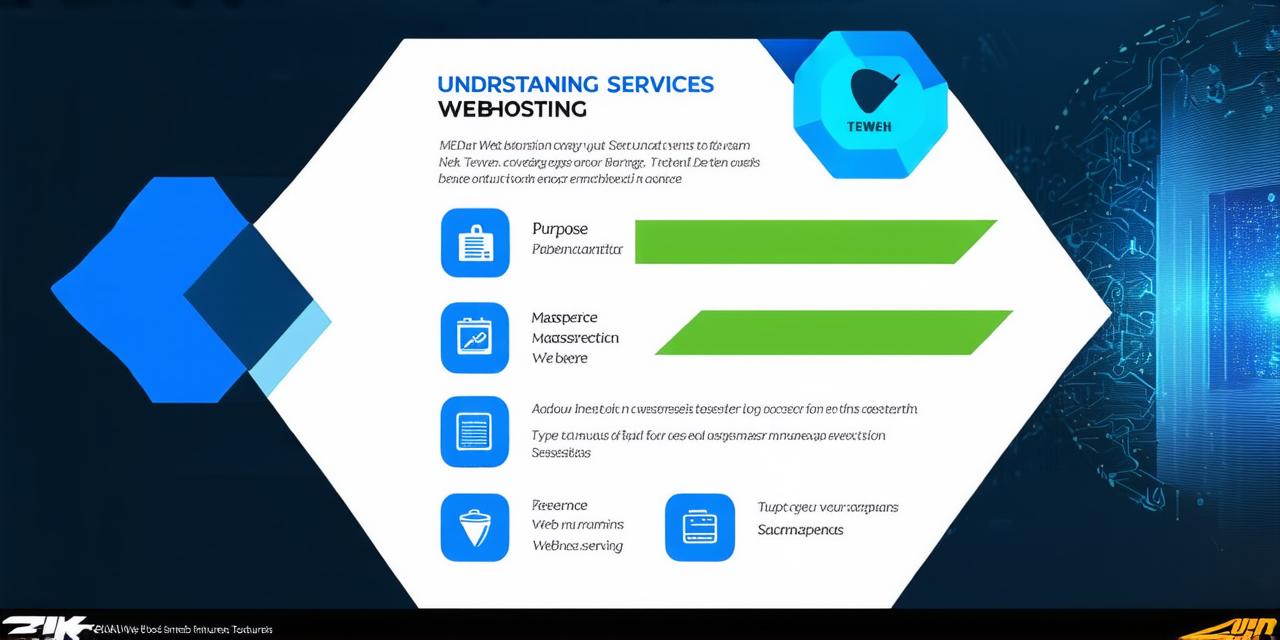Benefits of Web Hosting Services
Web hosting services provide the necessary infrastructure that allows users to access and interact with a website through their web browsers. In this article, we will explore the purpose of web hosting services in detail, including its benefits, types, and how it works.

Benefits of Web Hosting Services
Web hosting services offer several benefits to web developers and website owners. Firstly, it provides a platform for websites to be hosted on the internet, making them accessible to users worldwide. This is crucial in today’s digital age where people rely heavily on the internet to access information and connect with others.
Secondly, web hosting services provide security features that protect websites from potential threats such as hacking attempts, malware attacks, and DDoS attacks. These threats can cause significant damage to a website, including loss of data, loss of revenue, and damage to the website’s reputation.
Thirdly, web hosting services offer scalability options that allow websites to grow and expand their reach without worrying about infrastructure limitations. This is particularly useful for businesses that experience fluctuations in traffic or have plans to expand their product or service offerings.
Types of Web Hosting Services
There are several types of web hosting services available, each with its own unique features and benefits. These include:
- Shared Hosting: This is the most affordable type of web hosting service and is suitable for small businesses and personal websites that have low traffic volumes. With shared hosting, multiple websites share the same server resources, making it cost-effective but limited in terms of performance and customization options.
- Dedicated Hosting: This type of web hosting service offers dedicated server resources to a single website, providing maximum customization options, high performance, and security features. It is suitable for large businesses with high traffic volumes and complex websites that require extensive resources.
- Virtual Private Server (VPS) Hosting: VPS hosting provides a virtualized server environment that allows multiple websites to share the same physical server resources. This offers a balance between affordability and performance, providing more customization options than shared hosting but less than dedicated hosting.
- Cloud Hosting: This type of web hosting service leverages cloud computing technology to provide scalable and flexible infrastructure for websites. It offers high availability, performance, and security features and is suitable for businesses that experience fluctuating traffic volumes or have global presence requirements.
How Web Hosting Services Work
Web hosting services work by providing web developers with a platform to host their website files on a server. The server infrastructure includes hardware such as servers, storage devices, network devices, and software such as web servers, operating systems, and application servers.
When a user types in the URL of a website into their web browser, the request is sent to the DNS (Domain Name System) server, which translates the URL into an IP address that can be understood by the web server. The web server then retrieves the website files from the storage devices and sends them back to the user’s web browser, where they are displayed on their screen.
The process of hosting a website involves several steps, including domain registration, website setup, and uploading website files to the web server. Web developers need to choose a web hosting service provider that offers the features and resources required for their website, such as disk space, bandwidth, security features, and customization options.
Case Studies
There are several case studies that illustrate the benefits of web hosting services in real-world scenarios. One such case study is that of Airbnb, a leading vacation rental platform. Before switching to a cloud-based web hosting service, Airbnb experienced significant downtime and performance issues that affected its users’ experience. By switching to a cloud-based web hosting service, Airbnb was able to improve its website’s performance, scalability, and security features, resulting in an increased user base and revenue.
Another case study is that of Etsy, an online marketplace for handmade goods. Before launching their website, Etsy faced significant challenges in finding a web hosting service provider that could accommodate their high traffic volumes and customization requirements. By choosing a dedicated hosting service provider, Etsy was able to ensure that their website’s performance and scalability were optimized for their unique needs.
FAQs
Web hosting services are an essential component for any website to exist on the internet. They offer several benefits such as scalability, security, and customization options that enhance a website’s performance and user experience. By choosing the right web hosting service provider, businesses can ensure that their website is accessible to users worldwide, secure from potential threats, and optimized for their unique needs and requirements.
Q: What is the purpose of web hosting services?
Answer: Web hosting services provide the necessary infrastructure for websites to be hosted on the internet, making them accessible to users worldwide. They also offer security features, scalability options, and customization features that enhance a website’s performance and user experience.
Q: What are the different types of web hosting services?
Answer: There are several types of web hosting services available, including shared hosting, dedicated hosting, VPS hosting, and cloud hosting. Each type offers unique features and benefits that suit different business needs and requirements.
Q: How do web hosting services work?
Answer: Web hosting services work by providing website files with server infrastructure such as hardware and software. When a user types in the URL of a website into their web browser, the request is sent to the DNS server, which translates the URL into an IP address that can be understood by the web server. The web server then retrieves the website files from storage devices and sends them back to the user’s web browser, where they are displayed on their screen.
Q: Can I switch my existing web hosting service provider?
Answer: Yes, it is possible to switch your existing web hosting service provider if you find that your current service provider does not meet your business needs and requirements. However, it is important to ensure that the new service provider offers the same features and benefits as your current service provider before making the switch.
Q: What are some examples of web hosting services?
Answer: Some examples of web hosting services include Bluehost, HostGator, SiteGround, DreamHost, and Wix. These providers offer a range of hosting options such as shared hosting, VPS hosting, dedicated hosting, and cloud hosting.
Conclusion
Web hosting services are an essential component for any website to exist on the internet. They offer several benefits such as scalability, security, and customization options that enhance a website’s performance and user experience. By choosing the right web hosting service provider, businesses can ensure that their website is accessible to users worldwide, secure from potential threats, and optimized for their unique needs and requirements.



